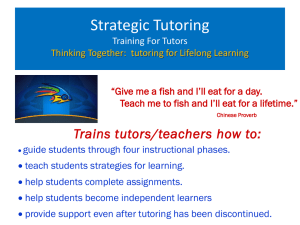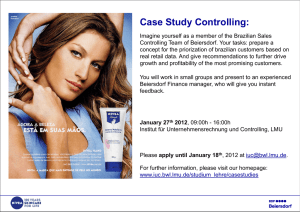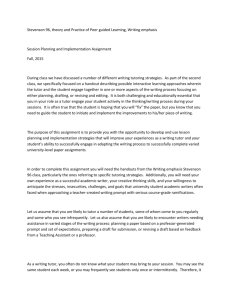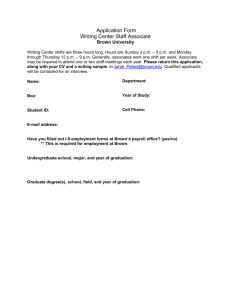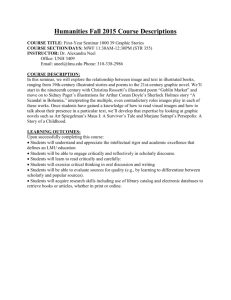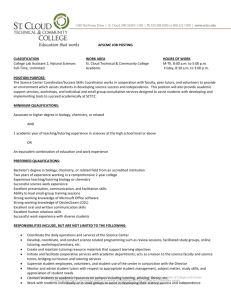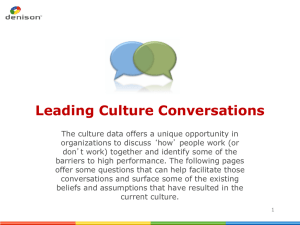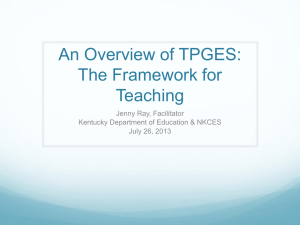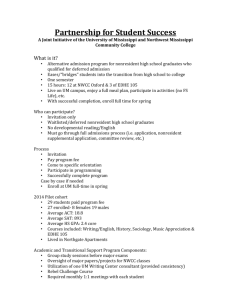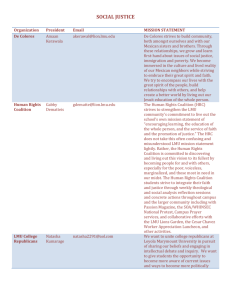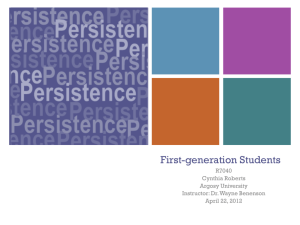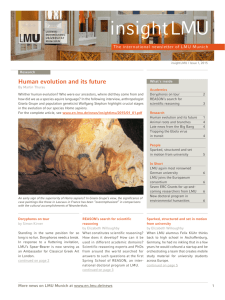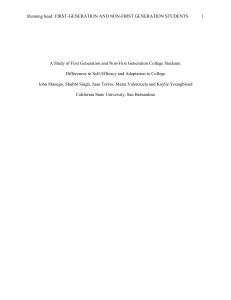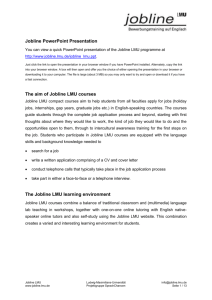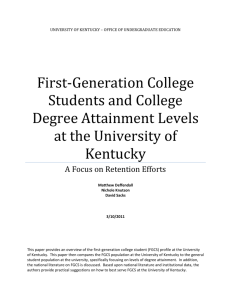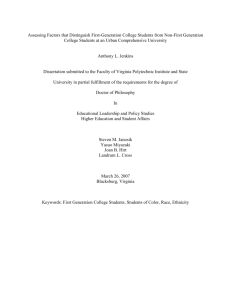ARC Learning Outcomes
advertisement
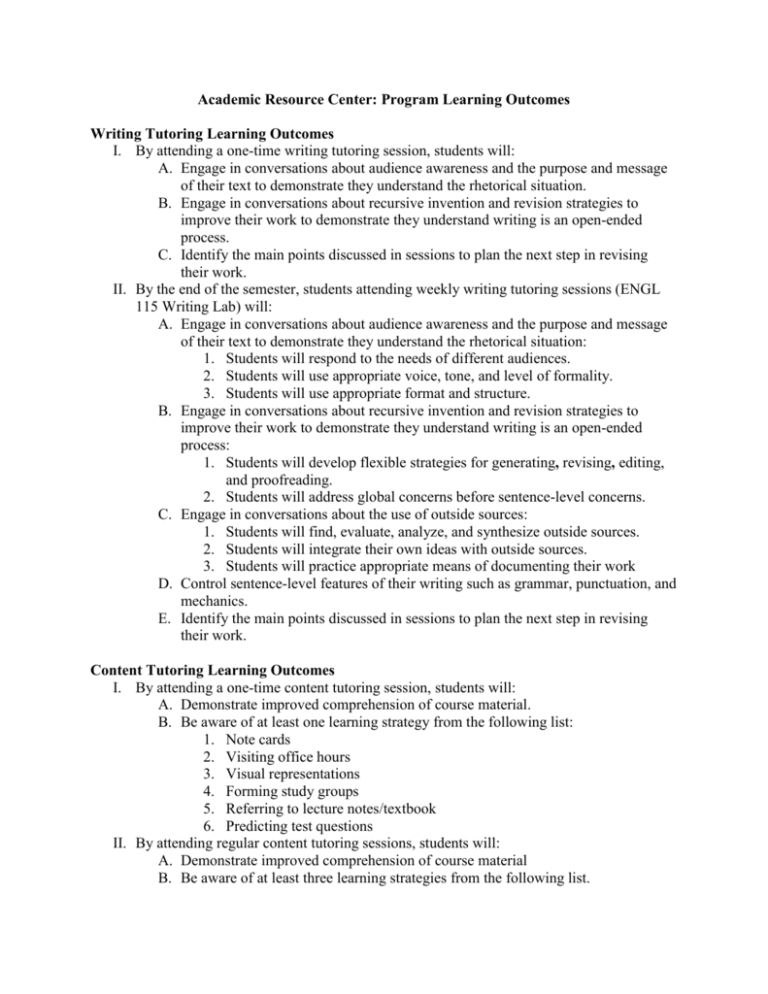
Academic Resource Center: Program Learning Outcomes Writing Tutoring Learning Outcomes I. By attending a one-time writing tutoring session, students will: A. Engage in conversations about audience awareness and the purpose and message of their text to demonstrate they understand the rhetorical situation. B. Engage in conversations about recursive invention and revision strategies to improve their work to demonstrate they understand writing is an open-ended process. C. Identify the main points discussed in sessions to plan the next step in revising their work. II. By the end of the semester, students attending weekly writing tutoring sessions (ENGL 115 Writing Lab) will: A. Engage in conversations about audience awareness and the purpose and message of their text to demonstrate they understand the rhetorical situation: 1. Students will respond to the needs of different audiences. 2. Students will use appropriate voice, tone, and level of formality. 3. Students will use appropriate format and structure. B. Engage in conversations about recursive invention and revision strategies to improve their work to demonstrate they understand writing is an open-ended process: 1. Students will develop flexible strategies for generating, revising, editing, and proofreading. 2. Students will address global concerns before sentence-level concerns. C. Engage in conversations about the use of outside sources: 1. Students will find, evaluate, analyze, and synthesize outside sources. 2. Students will integrate their own ideas with outside sources. 3. Students will practice appropriate means of documenting their work D. Control sentence-level features of their writing such as grammar, punctuation, and mechanics. E. Identify the main points discussed in sessions to plan the next step in revising their work. Content Tutoring Learning Outcomes I. By attending a one-time content tutoring session, students will: A. Demonstrate improved comprehension of course material. B. Be aware of at least one learning strategy from the following list: 1. Note cards 2. Visiting office hours 3. Visual representations 4. Forming study groups 5. Referring to lecture notes/textbook 6. Predicting test questions II. By attending regular content tutoring sessions, students will: A. Demonstrate improved comprehension of course material B. Be aware of at least three learning strategies from the following list. 1. Note cards 2. Visiting office hours 3. Visual representations 4. Forming study groups 5. Referring to lecture notes/textbook 6. Predicting test questions C. Demonstrate increased confidence in the subject they are studying. D. Be comfortable with the language of the discipline and use it in sessions. E. Demonstrate improved ability to succeed academically on their own. University Advising Learning Outcomes I. Students who use University Advising services will be able to: A. Identify the components of the LMU Core curriculum and articulate how the core is connected to the mission of the university. B. Express how their LMU experience is consistent with the liberal arts tradition. C. Students who have not selected a major will identify a field of study that is consistent with their values, interests, strengths and goals before they complete 60 semester hours. D. Identify the name of their advisors and how to contact them for an appointment. E. Access their CAPP reports to evaluate their progress toward degree completion. F. Find their registration times and register in an appropriate timeframe. G. Understand how to use the LMU Schedule of Classes and PROWL for registration needs. H. Obtain information about policies, procedures, and academic programs found in the University Bulletin, as appropriate to their specific academic needs. I. Develop learning strategies and habits that are transferable to their future workplaces. J. Identify and seek out appropriate student support offices, personnel, and faculty when they need academic assistance. First To Go Program Learning Outcomes I. By attending First To Go sponsored events, activities, and informational sessions, Firstgeneration college students who are transitioning into the university (e.g.: first-year freshmen, transfers, commuters, first-year graduate students) will: A. Understand the relationship between a productive transition into the university and sustained academic success. B. Be able to locate resources within the university that can aid transition into college. C. Develop strategies for navigating hidden curriculum, policies, and programs at LMU. II. By actively participating in the networking and community building opportunities offered through the First To Go Program, first-generation college students will: A. Build relationships with faculty and professional staff who can help facilitate students’ academic, professional, and personal development. B. Create connections with other first-generation students on campus. C. Use resources obtained through academic enrichment events and activities to further students’ goals. III. By seeking out opportunities to participate in the academic discourse of the university, first-generation college students in the First To Go Program will: A. Understand academic discourse as transactional and recognize the value of their contributions to research, conferences, panels, critical and creative publications, etc. B. Learn discursive conventions of the university in order to participate in specialized conversations. C. Understand how to use knowledge and language to bridge the gap between privileged and disempowered and/or underrepresented groups. IV. By developing an awareness of the diverse types of social capital first-generation college students bring into the university, students participating in the First To Go Program will: A. Learn how to apply strengths common to first-generation college students (e.g.: resilience, resourcefulness, creativity, and dedication) to various situations in order to succeed at the college level. B. Build stores of social capital by drawing on academic resources, professional development opportunities, and mentoring relationships. C. Develop strategies for integrating social capital built at LMU into post-graduate study or work. First To Go Writing Workshop Learning Outcomes I. Through active participation in the Writing Community Workshop, students enrolled in ENGL 115 will develop knowledge of genre. Specifically, students will: A. Understand the personal narrative as a genre composed of distinct rhetorical conventions. B. Recognize the interdependence of audience, purpose, and message within the genre of personal narrative. C. Engage creatively and critically with the conventions of personal narrative in order to effectively communicate their experiences in both written and oral form. II. By understanding and learning to value writing as a process, students will: A. Be able to articulate the effects of their personal environments on their individual writing processes. B. Develop flexible strategies for writing, work-shopping, revising, and editing drafts of personal narratives. C. Provide useful peer feedback to workshop participants on drafts of personal narratives. III. Through active engagement in their peer writing community, students will: A. Express the ways in which individual beliefs, values, faith, and culture shape actions and attitudes. B. Demonstrate respect for individual/group difference and an awareness of the richness afforded by multiple perspectives. C. Be able to articulate the growth and integration of their intellectual, physical, social, cultural, and spiritual selves with their communities. LMU Common Book and Book Festival Learning Outcomes I. Students will make meaningful connections with faculty, staff, students and community members through Common Book sponsored activities. II. Through interdisciplinary exploration, students will investigate key concepts, themes and complex issues raised in the text, thus furthering their critical thinking skills. III. Students will learn more about themselves and the world around them as they explore diverse ways of thinking and being. IV. Students will develop an interest in recreational reading. Bunche Global Diversity Initiative I. Students will make meaningful connections with faculty, staff, students and community members through Bunche Global Diversity Initiative sponsored activities. II. Students will learn more about themselves and the world around them as they explore diverse ways of thinking and being. III. Students will develop an interest in international travel and activities. IV. Students will understand the process of applying for Study Abroad.
